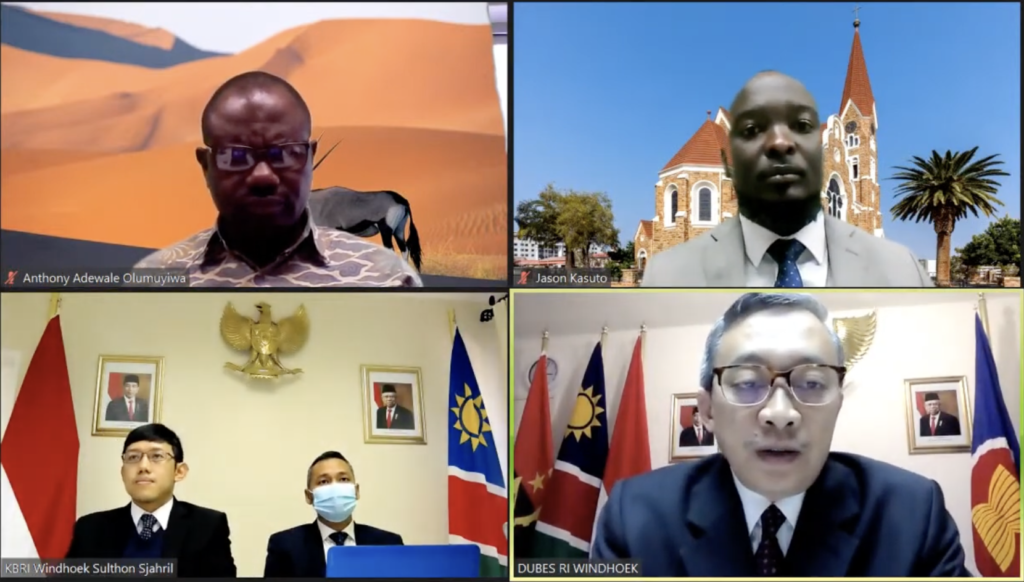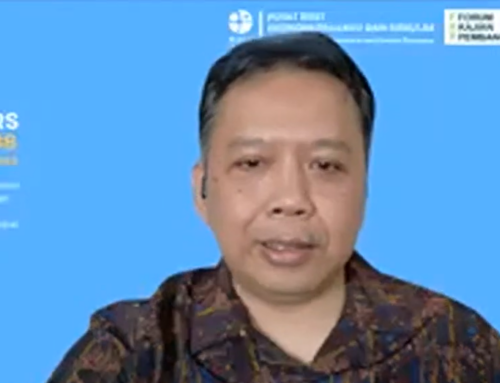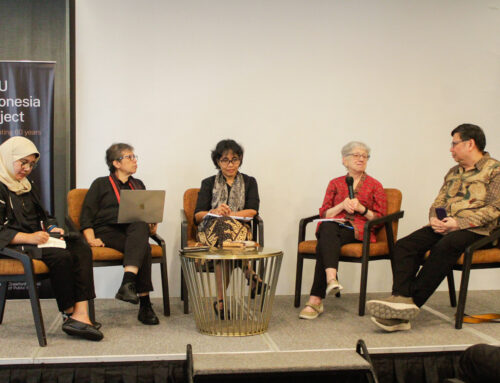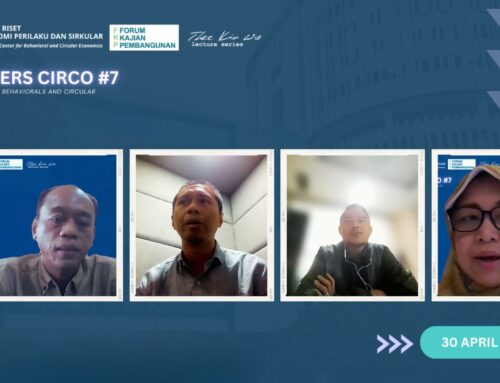FKP hosted by Embassy of the Republic of Indonesia in Windhoek, Namibia, with HE Wisnu Edi Pratignyo (Indonesian Ambassador to Namibia), Ari Hadiman (Embassy of the Republic of Indonesia in Windhoek), Sulthon Sjahril (Embassy of the Republic of Indonesia in Windhoek), Jason Kasuto (Economic Association of Namibia & High-Level Panel on the Namibian Economy), and Anthony Adewale Olumuyiwa (CEO of Future Image Investment). Monday, 10 May 2021.
KEY POINTS:
- Indonesia and Namibia diplomatic relations have been established since 13 May 1991 and shortly thereafter the Indonesian Embassy in Windhoek was opened in 1992. The 13th May 2021 marks the 30-year anniversary of diplomatic relations between Indonesia and Namibia. Over the three decades, bilateral relations are highlighted by increasing economic cooperation including trade, investment, tourism, agricultural and technical cooperation.
- Namibia is a small open economy and has a stable political condition, thus making an added value for Namibia as a market destination for foreign companies and investors. If Indonesia & Namibia establish a Free Trade Agreement (FTA), it is expected to increase trade volume by US$213,306. The FTA is expected to open market access for Indonesian products such as furniture, noodles, footwear, and parts of the motor vehicles to enter the Namibian market.
SUMMARY
- Indonesia and Namibia diplomatic relations have been established since 13 May 1991 and shortly thereafter the Indonesian Embassy in Windhoek was opened in 1992. Meanwhile, the Namibian Government established its Embassy in Kuala Lumpur, which is also accredited to Indonesia. Indonesia was one of the first countries to acknowledge Namibia’s independence and then became one of the few diplomatic representations to Namibia in 1991.
- The 13th May 2021 marks the 30-year anniversary of diplomatic relations between Indonesia and Namibia. Over the three decades, bilateral relations are highlighted by increasing economic cooperation including trade, investment, tourism, agricultural and technical cooperation. At this moment, when the world faces the COVID-19 pandemic it is important to strengthen economic cooperation for mutual benefits. In Namibia, both the GDP and the GNI have seen an average growth of 6% over the 8-year period. As of 2020, a 3% contraction observed in the National economy can be attributed to the COVID-19 pandemic.
- Namibia is a small open economy and has a stable political condition, thus making it an added value for Namibia as a market destination for foreign companies/investors. Namibia has international standard cross-border transportation infrastructure and networks, making it a great alternative as a logistics hub in the West Coast of Africa for landlocked countries of the Southern African Development Community (SADC) such as Zimbabwe, Botswana, Democratic Republic of Congo (DRC), Malawi, and Zambia.
- In 2015, the bilateral trade relations between Indonesia and Namibia was US$9.22 million and in 2020 the bilateral trade volume decreased to US$4.72 million due to the pandemic. If Indonesia and Namibia establish a Free Trade Agreement (FTA), it is expected to increase trade volume by US$213,306. The FTA is expected to open market access for Indonesian products such as furniture, noodles, footwear, & parts of motor vehicles to enter the Namibian market. Namibian products such as milk and cream, and dates will be able to further penetrate the Indonesian market.
- Namibia has several investment opportunities, namely agriculture (Biomass and horticulture products), tourism, infrastructure (green hydrogen, real estate, water supply, and sanitation), and healthcare. In the energy sector, for example, only 51.8% of the population has access to electricity. Eliminating the existing backlog in addition to keeping up with growth and rural electrification will require a total investment of some N$3.4 billion over the next ten years. Also, Namibia’s Government aims to Increase local electricity generation capacity from 624 MW (2020) to 879 MW by 2025.
- In the real estate sector, the estimated Namibia’s housing backlog of 300,000 in 2018. The total investment opportunity for affordable housing is NAD 44,5 billion or equal to U$D 3 billion. The government outlined plans to deliver 20,000 housing units countrywide by the end of the 2nd Harambee period, through partnerships with the public and private sector.
- In the agriculture sector, about 45 million ha of Namibian farmland is still said to be bush-encroached, resulting in an unbalanced ecosystem and land degradation in terms of rangeland carrying capacity for livestock. This sets an opportunity for private sector investors to establish industry diversification to build a vibrant, inclusive, and nationally beneficial bush biomass sector.
- In terms of consumer behavior in Namibia, the people are not adventurous – they tend to stick to brands they know. The consumer appreciates quality, and price plays a big role. Consumers prefer to buy from formal markets, such as supermarkets and registered retail outlets. There is great potential in Process food and beverages products. Namibia imports most of the processed food from South Africa. Namibia is surrounded by land-lock countries namely Botswana, Zambia, Zimbabwe, DRC. Namibia has one of the most efficient seaports in Africa and is politically stable. The establishment of a production plant of food and beverages will not serve Namibia alone but all neighboring countries.





